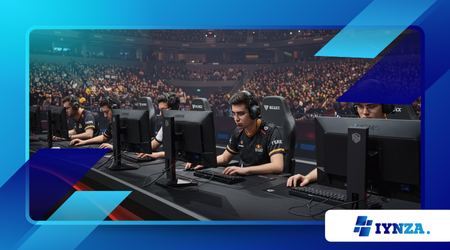The Mental Game: How Top Players Handle Pressure in Finals

In championship matches, it’s never just about skill. Reactions slow. Hands sweat. Thoughts race. Even the most seasoned players face an internal opponent: their own brain under stress. This is The Mental Game in action, and it’s where matches are often won or lost—before the first round even begins.
Anúncios
When under pressure, the brain triggers a stress response that floods the body with adrenaline and cortisol. These hormones prime muscles to react, but they also affect decision-making. Focus narrows, memory fragments, and instinct overrides logic.
For players in esports, this can be disastrous. Over-aiming, poor map awareness, or choking in a clutch moment can stem from this stress overload.
Top competitors know this and train their minds as intensely as their mechanics. Through exposure therapy, visualization, and breathing techniques, they teach their nervous systems to stay calm when everything is on the line.
They don’t just play the game. They own the moment. That’s the core of The Mental Game—mastering your mind under fire.
The Role of Routine: Building Mental Stability Before the Finals
High performers often follow strict routines before their biggest matches. These aren’t just rituals—they’re tools for mental regulation.
A predictable pre-match routine stabilizes heart rate, builds confidence, and tells the brain, “We’ve been here before.” It shifts the body out of fight-or-flight and into flow.
Some pros listen to the same playlist. Others wear specific clothes or use scent-based memory triggers like essential oils.
These seemingly small habits create consistency in the face of chaos. It’s no different from how athletes visualize their performance or warm up in familiar patterns. The goal is always the same: reduce variability, reduce stress.
The brain finds comfort in repetition. When external pressure spikes, an internal anchor is essential. This is why The Mental Game isn’t just about reaction—it’s about preparation. Your loadout, your warm-up, your breathing—all of it works together to shield you from performance panic.
Read also: Esports and Mental Health: Balancing Competition and Well-Being
Controlling Focus: Filtering Out Noise, Distractions, and Doubt
In a study of collegiate esports competitors, mean heart rates during matches reached an intense 131 bpm and even peaked at around 188 bpm—levels comparable to vigorous physical activity—highlighting how mental stress in finals translates into real physiological arousal
In the finals, distractions multiply. The crowd gets louder. Cameras flash. Social media buzzes. And inside, doubt whispers: “What if I fail?” Winning The Mental Game means learning to tune all of it out.
Elite players practice focus like a muscle—training their ability to stay locked into the present moment, no matter what surrounds them.
This isn’t natural. The brain loves novelty and danger. But pros override that tendency with habits. Many use mindfulness training. They practice returning to their breath.
They use mantras or physical resets, like tapping their keyboard or adjusting posture. Some work with performance psychologists to build mental resilience—like treating intrusive thoughts as noise to ignore.
In these moments, the only thing that matters is the next play. Not the scoreboard. Not what’s at stake. Just the crosshair, the map, the callout. The Mental Game is about choosing where your attention goes—and refusing to let it go anywhere else.
Managing Tilt and Emotional Swings Mid-Match
No player goes through a final without some mistakes. A bad round, a missed shot, a wrong call—it happens. But what separates champions is how quickly they recover. Emotional control mid-game is one of the most underrated aspects of The Mental Game.
Tilt doesn’t just happen to angry players. It happens when expectations break. A perfect strat fails. A teammate disconnects. You let down the team. The mind spirals. You rush decisions. You force plays. Performance collapses. That’s what tilt is: the breakdown between emotional state and logical action.
To fight this, top players use rapid reset techniques. Some do a simple count-in, like “3-2-1-new round.” Others self-coach out loud, saying, “That’s done. Next play.” Many rely on team dynamics—positive reinforcement, short affirmations, or reframing moments as opportunities.
It’s not about staying emotionless. It’s about not letting emotion drive. Mastering The Mental Game means bouncing back instantly, again and again.
Confidence: Where It Comes From—and How It Holds Under Fire
In a time where mechanical skill is increasingly equal across high ranks, The Mental Game is what truly separates contenders from champions.
It’s not about who can aim better or memorize more callouts—it’s about who can think clearly when the stakes rise, who can stay grounded when doubt creeps in, and who can bounce back after a mistake without collapsing.
More and more, teams are investing in mental coaches, performance psychologists, and structured mindset training because they know this is where margins are made.
Split-second decisions in finals aren’t just reactions—they’re the outcome of emotional control, self-awareness, and trust built over hundreds of hours of mental discipline.
But even if you’re not on the main stage, these lessons apply. They help you enjoy your matches more. Stay calmer when you queue solo. Be a better teammate when things go wrong. Compete with clarity and finish your sessions feeling proud, not frustrated.
The Mental Game isn’t just for pros. It’s for anyone who wants to stop feeling like they’re at war with themselves every time they log in. The next time you tilt, freeze, or doubt—pause. Breathe. Refocus. That’s how you train your mind to win, one play at a time.
FAQ: The Mental Game in Esports
1. How do pro gamers train their mental game?
They use routines, mindset coaching, breathing exercises, and simulated high-pressure practice to improve emotional regulation and decision-making under stress.
2. Can casual players benefit from mental game techniques?
Absolutely. Even small adjustments—like breathing consciously, avoiding tilt, or reviewing mistakes calmly—can dramatically improve consistency and enjoyment.
3. What causes players to “choke” under pressure?
Choking happens when stress overwhelms working memory and motor control. This leads to second-guessing, hesitation, and performance drop.
4. Are there tools to help build mental strength for gaming?
Yes. Meditation apps, focus training, journaling, and performance coaching are becoming common in the esports world. Many techniques come from traditional sports psychology.
5. Can team environment affect mental game performance?
Definitely. Positive team dynamics can buffer stress. Toxic teams amplify doubt. Trust and communication are critical in high-pressure moments.
